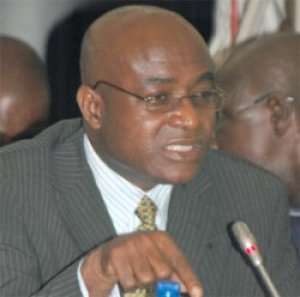
The long standing perception held many a Ghanaian that elected Members of Parliament (MP's) give priority to the interest of their various political parties at the painful expense of the general good of the country, has been reinforced by a confession of the Minority Leader and Vice Chairman of the Special Budget Committee of Parliament, Honorable Osei Kyei Mensah Bonsu.
Speaking at a workshop organized by Star-Ghana in Koforidua a fortnight ago Honorable Mensah Bonsu said 'Party Politics is greatly undermining the ability of the Parliamentary Committees to exercise oversight responsibilities.'
According to him the hierarchy and discipline of the Political Parties prevent Members of Parliament from raising concerns on issues of National interests.
'The party leadership can command much loyalty of its Members and impose firm discipline, because, ultimately, members rely on their parties for their seat in Parliament'.
He said the situation is not 'serving the country well since it is an impediment to the ability of a Parliamentary Committees to exercise its oversight functions effectively'.
Honorable Mensah Bonsu's observation brings into sharp focus some actions and inactions that have occurred in Parliament which go to suggest that the decisions of Members are determined by their Political Parties colors and not necessarily the good of their country.
The CNTC loan, the Vodafone sale, the National Health Insurance Bill during the Kufuor regime, the STX Housing loan, Chinese loan, the boycott of the appointments committee sittings and even the recent tax hikes are all examples of the strength and influence of the political parties in parliament.
Even the Auditor General's Reports and the Public Accounts Committee Reports which are left largely untouched is all because ruling parties sometimes think that a discussion on these will put them at a disadvantage. Everything is looked at with the lenses of the political parties and not the national interest. The only time MPs seem to agree is when the issues are about their welfare; car loans housing loans, salaries, allowances etc.
In that workshop where the Minority Leader spoke he also drew attention Order 38 of Parliament saying that even though the Majority Leader can be summoned under this Order it will not happen because majority of the members will not allow it even if it was justified.
The Minority leader stated that the flaw has been detected and now a special arrangement of de-facto chairmanship at the Special Budget Committee has been instituted to check it.
The Special Budget Committee is a Parliamentary Committee that is chaired by the Majority Leader with the Minority leader as Vice Chairman and comprises 19 other members.
The committee has the function of considering the budget of Parliament and other constitutionally independent bodies, including, the Commission on Human Rights and Administrative Justice , National Media Commission, Electoral Commission and National Commission for Civic Education.'
Last week the Centre for Democratic Development (CDD) launched a report which said that an overwhelming 87 per cent of constituents do not have any access or contact with their Members of Parliament.
Even for Political Parties officials who are ordinarily assumed to be representatives of mass organizations, 87 per cent of respondents reported low contact with them.
The worst revelation of the CDD report is that members of the public (89 per cent) say they do not have any relationship or interactions with party officials or Members of Parliament.
The question that comes up then is on what basis do Members of Parliament make contributions on issues on the floor of Parliament?




 No need to tax churches – Bawumia
No need to tax churches – Bawumia
 Voter registration: NPP rebukes NDC over request for serial numbers of BVR kits
Voter registration: NPP rebukes NDC over request for serial numbers of BVR kits
 Parliament to summon VRA for failing to dredge Volta estuary for years
Parliament to summon VRA for failing to dredge Volta estuary for years
 Stop the desires for coup d'état — Ghanaians told
Stop the desires for coup d'état — Ghanaians told
 Manhyia Palace bans Tricycle riders on Sunday to climaxes Otumfuo's 25th anniver...
Manhyia Palace bans Tricycle riders on Sunday to climaxes Otumfuo's 25th anniver...
 Blame Supreme Court for limited voter registration challenges – George Opare Add...
Blame Supreme Court for limited voter registration challenges – George Opare Add...
 Excessive partisanship breeds madness — Prof Gyampo on NPP’s defence of cedi dep...
Excessive partisanship breeds madness — Prof Gyampo on NPP’s defence of cedi dep...
 PDS scandal: ‘The totality of Ghana’s loss is the ‘dumor’ being experienced toda...
PDS scandal: ‘The totality of Ghana’s loss is the ‘dumor’ being experienced toda...
 677,140 births and 50,992 deaths recorded in 2022 - Statistical Report
677,140 births and 50,992 deaths recorded in 2022 - Statistical Report
 Ghana’s electoral commission is one that trusts thieves — Omane Boamah
Ghana’s electoral commission is one that trusts thieves — Omane Boamah
